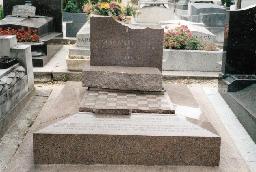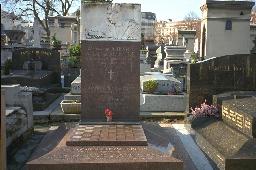Alekhine, Alexander Alexandrovitch |
| CHESS PLAYER (RUSSIA) |
|
BORN 31 Oct 1892, Moscow - DIED 24 Mar 1946, Estoril: Hotel Palace CAUSE OF DEATH choked on chicken bone (probably in combination with a heart attack) GRAVE LOCATION Paris: Cimetière du Montparnasse, 3 Boulevard Edgar Quinet (division 08) |
|
Alexander Alekhine was the son of a wealthy landowner who was a member of the Russian Duma. He had an older sister, Varvara (1889-1944), and and older brother, Alexei (1888-1939). In 1908 he defeated Curt von Bardeleben in a match in Düsseldorf. He quickly became a strong chess player and in 1914 finished third behind Lasker and Capablanca at an important international tournament in St. Petersburg. In 1914, when he was participating (and leading) in a German chess tournament, he was taken to Rastatt as a prisoner of war. The Germans released him after he feigned madness and he was able to return to Russia. In 1916 he served for the Red Cross on the Austrian front. He suffered from shell shock twice and was hospitalized in Tarnopol. After the revolution of 1917 most chess activities were ended in Russia. In 1918 he went to Odessa to play chess, but after the Russians reconquered the Ukraine in 1919 he was imprisoned and put in a death cell in Odessa under suspicion of being a spy. In the West there were rumours that he was killed, but he was released and in 1920 he won the championship of Moscow. His father, however, had been killed by the Bolesheviks and around this time he was no longer able to leave Russia. In 1920 he married the Russian baroness Sewerin and for a while he worked as interpreter for the Komintern. There he met the 42 year old Swiss journalist and Comintern delegate Annalisa Ruegg (1879-1934), whom he married on 15 Mar 1921, mainly to escape from Russia. They had a son in 1922, Alex. He managed to obtain permission to leave Russia with her and subsequently left her in Paris. They divorced in 1924. Alekhine settled in France and studied law at the Sorbonne. His thesis on the Chinese prison system was never completed, but he called himseld Dr. Alekhine all the same. In 1927 he married Nadezda Vasiliev, the widow of a Russian officer and again older than himself. By this time he had won many chess tournaments and in 1927 he became world champion by beating Capablanca. He spoke against communism and Russia declared him enemy of state (around 1939 his elder brother was killed by the Soviets). A rematch against Capablanca never took place, Alekhine insisting on exactly the same conditions as for the previous match. He defended his title twice against Bogoljubow, but surprisingly lost it against Max Euwe in 1935 (probably because he drank too much). In 1935 he married Grace Freeman Wishar, an American born Jewish widow of a British tea planter who was sixteen years his senior. She was the owner of a castle and some land in France and she drank as heavily as he did. But Alekhine managed to leave the bottle alone for a while and was able to regain his title against Euwe in 1937. He was on board 1 for France at the olympiad in Buenos Aires when the Second World War broke out. Alekhine refused to play against Germany. He returned to Europe, to become an interpreter in the army. After France was defeated by the Germans he had to cooperate with the nazis to protect his Jewish wife (and her posessions). He started drinking again and his name was under six articles in which Jewish chess players were criticised. In the articles it is stated that Jews play a cowardly type of chess and Arians a brave and attacking kind of chess. Alekhine played in tournaments organised within the German Reich and occupied territory (Munich, Salzburg, Krakow/Warsaw, Prague). His wife wasn't allowed to leave France by the nazis so Alekhine was more or less forced to continue the cooperation and act as their representative in chess matters in Portugal and Spain. In 1944 he was interviewed by a Spanish newspaper and he stated that he had played under duress and that the nazis had rewritten the technical articles that he wrote to obtain an exit visa from France. After the war he wasn't invited to chess tournaments because he had worked with the nazis. His chance to return to the chess world came when Botwinnik wanted to challenge him for the world title, but before the challenge was formally delivered he suddenly died in a hotel room in Estoril. Nobody claimed the body and after three weeks the Portugese Chess Federation arranged the funeral. Less than a dozen people were there. In 1956 his body was moved to Paris where the world chess organisation FIDE paid for his tombstone. His wife had died in 1956 and manuscripts of the nazi articles in his handwriting were among her personal effects. Alekhine loved cats. He often played in tournaments with his cat, named Chess, at his side. He spoke ten languages fluently. |
| Images |
Sources • Frank, Joachim A., Schaakbrevier, Ad. Donker, Rotterdam, 1980 • Kasparov, Garry Kimovich, My great Predecessors, Part I, Gloucester Publishers, London, 2003 • Alexander Alekhine - Wikipedia (EN) |




